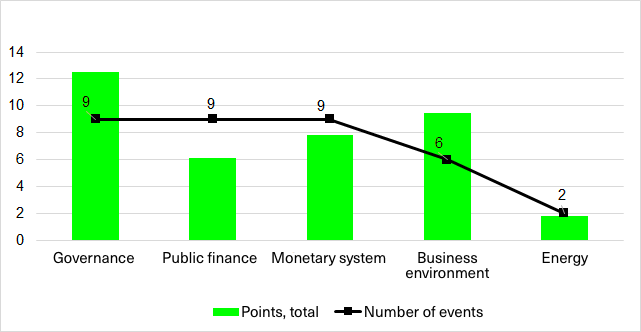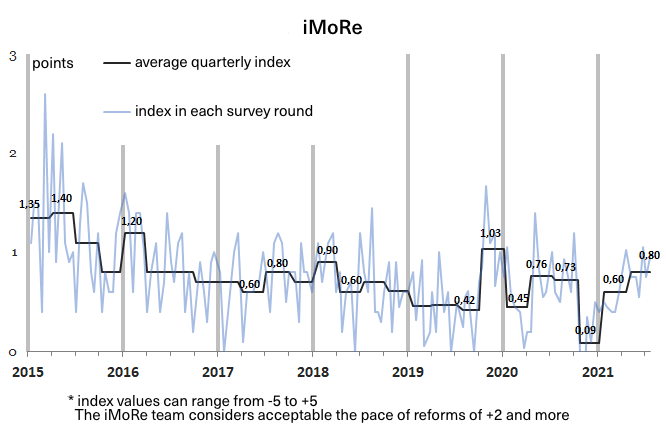In the second quarter of 2021, the authorities decided not to initiate substantial reforms, instead directing their efforts at “pressing home” the reforms already underway
Foreign currency borrowers got their turn. The authorities legislated the conversion of all foreign currency loans taken before the 2008 crisis into hryvnia. It also facilitated the insolvency and bankruptcy procedures for borrowers.
Hromadas received the right not only to dispose of the land within their localities but also of the land outside them. The Verkhovna Rada also passed a law governing the sale and rent of the land in state or communal ownership via e-auctions.
There was also progress in the area of education. Ukraine started recognizing professional qualifications obtained in the EU and initiated the process of creating the Qualifications Register that will allow a person to prove a specific professional qualification even in the absence of a diploma. The MPs also changed the procedure for conferring scientific degrees and finally set up liability for plagiarism in dissertations. The Cabinet of Ministers laid down and approved the requirements for interdisciplinary programs.
Read on for more details.
Among all the regulations issued by central authorities, iMoRe experts identified 35 potential game-changers in the country. It is a little less than in the first quarter where we counted 39 important changes.
Among the 35 reforms, 31 got positive grades, three got zero points from experts, with one being an anti-reform. The average event score in the round is +1.0 points in the range from +5 to -5 (in the previous quarter, it was +1.1 points).
Top reforms
This time, only two events surpassed +2.0 points, which, in our opinion, separates significant reforms from less important ones:
✓ law on deregulation in the sphere of land (iMoRe 161, +2.5 points) empowers local governments to manage the land within hromadas’ territory. Previously, hromadas could only dispose of the land within their localities, while the land outside them was state-owned. Now, local authorities will also be entitled to dispose of this land, monitor its intended use and give permission to change the designated purpose of especially valuable land (previously, such decisions required the approval of the CMU and Parliament).
✓ Debt collection law (iMoRe 158, +2.5 points) is meant to regulate this sphere protecting consumers from abuse by debt collecting companies. The National Bank will create an open register of debt collecting companies to list the companies meeting the requirements of integrity and having owners with a clean reputation, i.e. the ex-CEOs and ex-owners of bankrupt banks will not be able to head debt collecting companies. Only the companies listed in the Register will have the right to operate. The collectors’ work rules also become clearer. Thus banks will be able to engage collectors only if consumers give their consent to it when signing the loan agreement. Debt collecting companies will be prohibited from threatening, blackmailing or misguiding debtors or their close ones, informing a third party about borrowers’ debt, or even from interacting with a debtor more than twice a day (without the latter’s consent) or calling them from withheld numbers.
Between zero and nil
Zero points were assigned to the regulations having both positive and negative impacts in their respective areas, as well as those, which in the minds of iMoRe experts cannot affect the situation in the country. In this round, we counted three such documents:
✓ law on converting foreign currency loans into hryvnia (iMoRe 159, 0.0 points) establishes the procedure for mandatory debt restructuring of foreign currency loans (previously, it was set forth by an agreement between the bank and the borrower). ”…in this case, the hardest part is to find a compromise that would satisfy the borrowers who are also voters and the banks. The latter aren’t only interested in returning the loans they issued earlier, but they also hope that future borrowers will pay them up as well, and not count on “presents” from lawmakers,” warns Mykhailo Demkiv, ICU.
✓ law on basic principles of youth policy (iMoRe 160, 0.0 points) is a framework law outlining Ukraine’s possible youth policy directions. The law contains an interesting idea of funding the Ukrainian Youth Fund that will provide grants on a competitive basis using not only budgetary funds but also contributions from individuals and legal entities. At the same time, the law contains provisions on subsidized housing for young people, which is unlikely to be implemented in Ukraine.
✓ the new procedure for applying penalties for violations in the sphere of international trade (iMoRe 161, 0.0 points) sets the size of penalties for violations of currency legislation. For instance, the penalty for the first violation is 25% of the transaction amount, with the penalty for repeated violations within the year being 50%.
Anti-reform:
✓ the only anti-reform of the second quarter was the law on tax amnesty (iMoRe 163, -0.8 points). According to the law, a one-time voluntary declaration by individuals of their assets is to be carried out from September 1, 2021, to September 1, 2022. One will be able to enter in the declaration the assets (property or money) received as taxable income in Ukraine for which taxes should have been (but were not) paid. The state will deduct a fee of 2.5-9% from such assets, depending on the asset types. Experts note that the law has several shortcomings. Specifically, the provisions on parking cash and banking metals in special accounts are insufficiently detailed. Also, no bank is authorized to trace the source of these funds. According to the Main Legal Department of the Verkhovna Rada, the law is in violation of several articles of the Constitution. Another drawback is the injustice done to those paying their taxes honestly. Implementing the law might bring about the practice of tax evasion while waiting for the next amnesty.
What changed in key areas?
In the second quarter of 2021, we saw reform in all areas. Although governance, public finance and the monetary system have the same number of reforms, namely nine, the overall progress in “public finance” and “monetary policy” was worse than in “business environment” with its 6 (but more significant) reforms.
Graph 2. Points by area, the first quarter of 2021
Source: iMoRe No.158-163
Governance
In this area, we singled out 9 significant changes. Four of them were initiated by Parliament, four more by the Cabinet of Ministers, and one by the President. The most important events in this area concern digitization and open data:
✓ law equating e-passports to traditional paper passports (iMoRe 158, +2.0 points) makes it possible to use e-passports on a permanent basis. E-passports can be obtained by everybody having a biometrical paper passport or an ID card. It is convenient because it provides protection from the risk of losing or damaging the physical passport. However, whether the Diia app provides protection and verification of personal data is still an open question. But at any rate, experts consider expanding the range of possibilities encompassed by the e-passport to be a considerable step forward.
✓ resolution on open data (over 1,000 sets) (iMoRe 159, +2.0 points) is meant to sort out data sets published by different bodies and sometimes coming out late or in a non-machine-readable format. To tackle this problem, the Center of Competence in the field of open data, “Diia. Open Data”, will be created to centralize this function.
✓ resolution on open data of customs declarations (iMoRe 160, +2.0 points) regulates access to customs information. Last year, the Customs Service created a portal, where it was possible to analyze data on exports and imports, but, due to largely detailed data, there was a risk of identifying firms and disclosing commercial information. The new resolution is supposed to ensure the balance between the interests of analysts and researchers and the protection of commercial firms’ data. To this end, “the customs bodies will be obligated to take every reasonable measure to render information anonymous based on the findings regarding the risk of disclosing confidential information,” explains Tetiana Tyshchuk.
✓ law on the all-Ukrainian referendum (iMoRe 158, +1.0 points) replaces the previous law on the referendum that was deemed unconstitutional. According to the Constitution of Ukraine, the question of changing the territory and amending sections such as “General Provisions”, “Elections. Referendum” and “Making Changes to the Constitution of Ukraine” is to be decided at the all-Ukrainian referendum. The new law sets the procedures for holding such referendums.
Monetary system
Over the three months, 9 reforms in the area of monetary policy were approved by the government authorities. Four of them were initiated by the National Bank, four more by the Verkhovna Rada and one by the Cabinet of Ministers.
Apart from the above-mentioned law on debt collecting practices, the key changes include:
✓ resolution on disclosure of the ownership structure by the non-bank financial institutions (iMoRe 158, +2.0 points). After the “split law” took effect, the National Bank started to bring the rules for non-bank financial institutions in line with the rules for the banking sector. This resolution obligates non-bank financial institutions, including lessors and postal operators entitled to provide some financial services to report to the NBU on their ownership structure and publish it on their websites.
✓ resolution on opening accounts using e-passports (iMoRe 162, +0.5 points) is another step toward broader use of passports in the mobile phone. Now, the NBU allows banks to open accounts for Ukrainians based on their e-passport, foreign e-passport, electronic birth certificate and taxpayer registration number data via the Diia mobile app instead of presenting a physical passport.
Business environment
In the second quarter, we singed out six significant changes in the area of business regulation. Five of them were approved by the Verkhovna Rada and one by the Cabinet of Ministers.
In addition to the law on deregulating land relations that is one of the main reforms, these include:
✓ law on the sale of land on electronic auctions (iMoRe 163, +2.0 points) sets rules for the alienation of state and communal land. E-auction sales are to take place online and in real-time mode. Only the state electronic sales system can be used to make such bids. The law also enhances protection for tenants: now, the owner (state or hromadas) cannot put the land up for sale without their consent.
✓ procedures for the Unified State Electronic System in the construction sector (USESCS) (iMoRe 163, +2.0 points). As of last year, the USESCS functioned in a pilot mode. The purpose of the system is to take all administrative services in the area of construction online, systematize and disclose all the pertinent information on construction projects to ensure users’ access to it. This has to reduce corruption in construction. Already it is possible to use the system to obtain a construction passport, register the declaration of a facility’s operational readiness, submit the application for canceling the documents on the start of the preparation and construction works, etc. The approved procedures regulate the Unified System and provide for verification of information in other registers.
✓ law prohibiting the use of plastic bags in Ukraine (iMoRe 162, +1.5 points) provides for the phase-out of one-time plastic products that do not decompose in nature. The first restrictions are due to take effect on December 1 of this year prohibiting the use of plastic bags thicker than 50 microns in stores, markets, cafes and restaurants. The fines will amount to UAH 1.7-8.5 thousand to further rise to UAH 8.5-34 thousand as of March 10, 2022. Instead of regular plastic bags, companies will be able to use biodegradable bags. It will still be possible to buy non-biodegradable bags for personal use, but their price will be government-regulated, and it is likely to be high to curb demand for such packages.
Who is the biggest reformer?
In this quarter, the Verkhovna Rada was the absolute leader in approving reforms, with 19 important regulations under its belt. The Cabinet of Ministers is second, with 9 reforms. The National Bank and the President initiated 4 and 3 reforms, respectively. The President has the only anti-reform under his belt, namely the law on tax amnesty.
Graph 2. Initiators of the reforms in the second quarter of 2021
Source: 158-163 issues of iMoRe
Compared to the previous quarter, in the second quarter of 2021:
- there was a slight decline in the number of important regulations (35 in the second quarter versus 39 in the first quarter),
- the average score of the round grew from +0.6 to +0.8 points,
- the average event score reduced from +1.1 points to +1 points.
In the second quarter, the authorities got round to finishing their old tasks. Important land laws were passed, the issue of foreign currency loans was resolved, and the possibilities of the “state in the smartphone” were expanded. But in order to move forward, Ukraine needs to return to the cornerstone principles of a successful state as anti-corruption and judicial reforms remain stalled and their delays can quickly nullify the results achieved.
Graph 3. iMoRe quarterly average
Attention
The author doesn`t work for, consult to, own shares in or receive funding from any company or organization that would benefit from this article, and have no relevant affiliations





